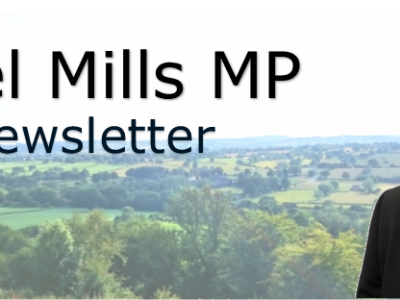Subscribe to Nigel’s email newsletters here

Dear Constituent,
Welcome to my December email newsletter. It’s been an eventful time for Amber Valley, with investments and changes in large national projects like HS2 and Rolls-Royce’s Small Modular Reactor’s affecting our locality greatly. There has also sadly been the rise of the Omicron Covid-19 variant, and the challenges this may bring.
Below you will find updates on the newly published Integrated Rail Plan, the Government’s plans to develop Modular Nuclear Reactors with Rolls-Royce, my actions in parliament relating to standards in public life, and a few of the visits I have been invited on here in Amber Valley.
With regards to Covid-19, new restrictions recently introduced, and uncertainty around the new Omicron variant growing, I will be holding a virtual residents’ meeting via zoom tomorrow, Thursday 16 December, at 8PM. So, if you have any concerns or questions you would like to raise with me, please reply to this newsletter or email nigel@nigelmillsmp.com to request to take part in the meeting.
Omicron & Plan B:
We have, since July, managed to cope with Covid with very few restrictions on normal life, and I sincerely hoped we could maintain that position in contrast to much of Europe, as well as Scotland, Wales and Northern Ireland. The number of cases has remained high, however, the vaccines have ensured that numbers requiring hospitalisation have remained at manageable levels and much lower than pre-vaccination.
This latter point is key, as we need hospitals not only to have the capacity to treat Covid patients but also others requiring urgent care and to start to clear the large backlog in planned care.
The new Omicron variant has sadly challenged this position. It is still too early to have a full understanding of this variant, even in South Africa let alone here, but there seems to be consensus that it spreads more quickly, and that 2 vaccine doses provide much less protection against infection. On the plus side, the variant does seem to be milder than the Delta variant – again, however, it is too early to be sure.
There seem to be 2 main problems we’re facing:
1) The new variant spreads much more quickly – currently doubling every 2 days. This means that the current level of restrictions that have kept the Delta variant at a high but stable level of infection, won’t contain Omicron, and if the current level of restrictions continue, we will very likely end up with much higher levels of infection in the coming weeks. It seems unlikely that the new variant will be sufficiently mild for there not to be more hospitalisations if infection levels are very much higher.
2) Without boosters, more of those infected will become seriously ill. The early data suggests that the 95% protection against serious illness offered by both the Pfizer and AZ jabs would be reduced to something like 75% – this would result in a 5-fold increase in the percentage needing medical attention. The booster restores much of this lost protection, hence the urgent need to roll them out.
The combination of more cases and a higher proportion needing medical care would inevitably lead to severe strain on the NHS. This will hopefully be mitigated if the variant does turn out to be milder, and the most vulnerable age groups have received a booster. In this current context though, I do agree with the Government that some more measures are needed to slow down the spread until we know more.
The new measures are in summary:
a) Mask wearing in more public places;
b) Advising those who can to work from home;
c) Requiring a negative test to attend the highest risk settings (eg nightclubs, large sporting events, indoor events with over 500 people). People can choose to show proof of vaccination instead but aren’t obliged to.
You can find the full new guidance here.
The measures in regard to the requirement to wear face coverings in more public spaces, proof of vaccination or a negative test for large venues, compulsory vaccination for NHS workers and rules around self-isolation were all voted on and approved by Parliament yesterday, and I voted in favour of these measures.
The new measures will not close any settings, nor will they introduce limits on mixing. These measures are not as restrictive as those in many neighbouring countries – for example, Ireland requires covid certificates at all hospitality venues. These are measures as moderate as we can keep them while providing some more control on the virus.
I would also urge everyone to get boosted – I had mine last week – and to use a lateral flow test before seeing vulnerable people or attending large gatherings. Please do get tested if you have symptoms. What may be mild for you may not be for who you pass the virus on to. There is no need to panic or cancel Christmas, and if we all take sensible precautions, hopefully we won’t need more restrictions in the coming weeks.
Integrated Rail Plan & HS2 update:
Throughout my time as MP for Amber Valley I have supported the Government’s proposed HS2 “y” route, linking the East Midlands with London, Birmingham, Sheffield and Leeds. The East Midlands has one of the slowest mainline services in the country and has suffered from a lack of infrastructure investment. I have always maintained that HS2 was a way of addressing this, speeding up journey times and adding new capacity, not only to London but also to the north, and to the west. In addition, the proposed stations at Toton and Chesterfield provided significant opportunities for regeneration and job creation.
The construction of HS2 has never been certain, with more reviews than I can recall culminating with the publication of the Integrated Rail Plan on 18 November that has made substantial changes to the original proposal. The “Y” route is now set to run to East Midlands Parkway (not Toton) with direct services continuing to Nottingham, Derby, Chesterfield and Sheffield on the current mainline. This mainline will now be electrified all the way to Sheffield. And it is possible that a separate mainline station could be built at Toton, subject to match funding from the private sector.
These proposals do contain some advantages compared to the original HS2 plan, including direct services to Nottingham and Derby which should enable easier connection to stations in Amber Valley. The electrification of the mainline is long overdue and should be completed a lot sooner than the previous HS2 plan, however, this decision does make the recent purchase of a number of diesel/electric trains somewhat redundant.
I also welcome that some of the rolling stock will be built by Alsthom and Hitachi at what was the former Bombardier site in Derby.
Despite these advantages, I believe this announcement leaves the East Midlands worse off than if the original HS2 plan was carried through to fruition. Electrification had previously been promised to the East Midlands only for it to be scrapped soon after due to cost increases. By comparison, Nottinghamshire not only gets a new HS2 station, but also the promise of support for 2 other line extensions. It is clear to me that we need equivalent funding for Derbyshire infrastructure and that’s what I’ll be pressing for in the coming months.
Rolls Royce & Small Modular Nuclear Reactors:
I was very pleased to recently learn of the Government’s plan to invest £210 million to back Derby based Rolls-Royce plc’s development of modular nuclear reactors. This Government investment is matched by £250 million from the private sector and will be used to design, test, and develop the Small Modular Reactors (SMR’s) which could be rolled out nationwide.
Each of these SMR’s will be manufactured in the UK and will be capable of powering up to one million homes. I have always believed that domestic nuclear power provides an opportunity for reliable, affordable, and low carbon energy, whilst also giving the UK greater energy independence and security. Our reliance on the availability of natural gas from abroad has made the UK vulnerable to price rises and supply issues. The Government’s move towards the introduction of these SMR’s should reduce our reliance on imported natural gas, and in the process create up to 40,000 high skilled jobs by 2050, many of which will likely be created in Derbyshire.
This is excellent news for Derbyshire, and the energy security, independence, and resilience of the UK more widely.
Standards in Public Life:
I know many of you are concerned about some of the events that have taken place in the house over recent weeks relating to standards in public life. I would like to take this opportunity to expand on some of these and explain my position and actions in the Commons.
On the 26 October, the Parliamentary Committee on Standards published a report which found that Owen Paterson had breached the MP’s Code of Conduct. The report concluded that Mr Paterson had repeatedly used his position as a Member of Parliament to promote companies through which he was employed as a consultant. In line with previous cases, the Committee’s report recommended that Mr Paterson be suspended from the service of the House for 30 sitting days.
Under current procedures, MPs are unable to appeal decisions made by the Parliamentary Committee on Standards, unlike other sectors of employment which provide an opportunity for the individual to appeal the decision taken by an employment tribunal. As a result of this inability to appeal, when the Commons voted on whether to suspend Mr Paterson, the Government enabled an amendment to be tabled, the Leadsom amendment, which proposed to retrospectively change the rules surrounding suspension. Effectively overturning the committee’s findings.
I could not support this amendment for the following reasons. Firstly, I had read the full report into Mr Paterson’s conduct, and I thought the process was fair. Secondly, I believed that creating a review of the standards process immediately after that process released its verdict, would give the impression to the public that the Government was trying to escape the verdict. And finally, the committee the Government proposed to replace the current Parliamentary Committee on Standards was developed at the last minute, without consultation, or engagement with other parties. And I believed that was not the correct way to develop an impartial standards process that the public can have confidence in. For these reasons, I voted against the Leadsom amendment.
I was however, heartened to see the Government change direction and not go ahead with the proposed retrospective changes to the parliamentary standards procedure.
Visit to Eco Vape, Alfreton:
Late last month, I was invited to visit Eco Vape Wholesale in Alfreton. The company was founded in 2014 and develops, manufactures, and retails e-cigarette liquids across the globe. At the centre of this world-wide distribution network is a 65,000 sq. ft. warehouse and manufacturing facility just outside Alfreton.
I was lucky enough to visit this Amber Valley manufacturer and get a tour of their facilities. It is always useful to hear the thoughts and concerns of local employers. And throughout my visit, it became clear to me that regulation of this growing industry needs to be enforced equally across the country. We can’t have good companies, that spend a lot of time and energy fully adhering to all relevant regulation, undercut by companies playing it fast and loose with people’s health.
Supporting White Ribbon Day:
On 26 November, I visited Salcare to support White Ribbon Day. Salcare is a local charity founded in 1977 to provide something of a “one-stop shop” of support for the people of Amber Valley and Erewash. The charity’s central ethos of helping those most in need, regardless of their circumstances, has made them a pillar of the local community in Heanor.
I was joined there by Phil Cox, Multi-Agency Risk Assessment Conference (MARAC) Chair, and Brian Bilby, Derbyshire Constabulary’s Operational Force Lead for Domestic Violence, to raise awareness for White Ribbon Day and its primary aim of ending violence against women.
Domestic violence against women is a truly horrific crime which affects too many women across the country. I know the Government understands this, and as part of the £40 million funding boost announced in February 2021, £20.7 million was allocated by the Government to local community-based sexual violence and domestic abuse services. I welcomed this investment, as I believe that community-based services in particular are vital for the prevention and cessation of domestic violence.
Work & Pensions Committee update:
As part of recent Work and Pensions Select Committee meetings, I engaged with Neil Couling, Change Director General of Universal Credit. I questioned Mr Couling regarding fraud and error within the current Universal Credit (UC) system, particularly with regards to self-employment. With UC fraud and error being on the rise recently, I wanted to determine whether this trend was a temporary symptom of the pandemic, or a growing system problem.
I was assured by Mr Couling that the Department for Work and Pensions (DWP) believes the driving force behind the increase in fraud and error is indeed a symptom of the pandemic. One that should be reduced with the reintroduction of the minimum income floor (MIF), which is used to calculate how much UC a self-employed individual is entitled to, given their income relative to the National Minimum Wage.
Mr Couling believes that as self-employed individuals made legitimate claims in the early days of the pandemic, after their work was effectively shut down by restrictions. Some claimants have returned to self-employed working, but have not reported that fact, and therefore, are continuing to receive UC payments they are not entitled to. However, once the MIF is reintroduced, the system should begin to capture those cases who have failed to disclose their return to employment.
Street Watch:
As always, if there are any street repairs in your area, such as potholes, pavement repairs or broken street lights, you can report these issues and concerns to me quickly and easily here so I can ask for the repairs to be investigated and addressed.
GDPR and privacy notice:
Data laws changed with the introduction of the new GDPR legislation: you can find my office’s privacy policy here and, if you don’t want to receive these emails anymore, you can unsubscribe here.
Get in Touch!
As always, you can contact me by hitting the ‘reply’ button on this email, or you can ring my office on 01773 744341.
Twitter and Facebook
You can also follow me on Twitter @NigelMills and like me on Facebook here to stay up to date with news and events in Amber Valley throughout the month.
Yours sincerely,

Promoted by Nigel Mills MP, of Unicorn House, Wellington Street, Ripley, Derbyshire, DE5 3EH.
You’re receiving this newsletter because you subscribed to my mailing list.
Would you like to unsubscribe? Unsubscribe from this Newsletter here.

